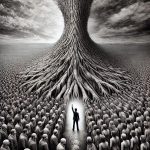
When the Mind Breaks, the Portfolio Follows
Jul 2, 2025
Picture the typical investor during a market crash: six screens open, CNBC blaring, Twitter refreshing every thirty seconds, portfolio apps updating in real time. Red numbers everywhere. Breaking news alerts pinging constantly. The brain, designed for survival in small groups on African savannas, tries to process financial information flowing at fiber-optic speed.
When the mind’s stuffed with data, mistakes happen. Cognitive load—the mental effort required to process information—doesn’t just slow down thinking; it fundamentally changes how decisions get made. Under pressure, sophisticated analysis gives way to crude heuristics. Complex market dynamics get reduced to simple binary choices: buy or sell, fear or greed, in or out.
Understanding how cognitive load impacts investor decisions in volatile markets isn’t just academic theory—it’s the difference between surviving market chaos and becoming another casualty. Because when information overload meets financial stress, even smart people make catastrophically stupid choices.
The Overloaded Brain’s Shortcuts
Cognitive load theory explains why brilliant investors make terrible decisions during market volatility. When the brain becomes overwhelmed with information, it automatically shifts from deliberate, analytical thinking to fast, intuitive judgments. These mental shortcuts—called heuristics—work fine for simple decisions but become dangerous when applied to complex financial markets.
Under high cognitive load, investors rely more heavily on availability bias, judging probability by how easily examples come to mind. During the 2008 financial crisis, investors who watched too much financial news became convinced that every market decline was the beginning of another Great Depression. The constant stream of negative headlines made catastrophic outcomes feel more likely than they actually were.
This isn’t weakness—it’s how human cognition works under pressure. The prefrontal cortex, responsible for complex reasoning, literally shuts down when overwhelmed. What’s left is the limbic system, designed for fight-or-flight responses, not portfolio management.
Volatility as Cognitive Warfare
Volatile markets don’t just create financial stress—they wage psychological warfare on investor cognition. Each price swing demands attention, each news headline requires evaluation, each expert opinion needs consideration. The sheer volume of stimuli creates cognitive overload that makes rational decision-making nearly impossible.
Consider how cognitive load affected decisions during the meme stock frenzy. Investors trying to follow GameStop’s price action while parsing Reddit threads, analyzing short interest data, and tracking social media sentiment experienced severe cognitive overload. The result wasn’t better decision-making—it was worse. People abandoned fundamental analysis for tribal loyalty, swapping research for memes.
This pattern repeats across market cycles. During the crypto boom, investors juggling dozens of altcoins, monitoring multiple exchanges, and tracking regulatory developments became cognitively exhausted. They started making decisions based on Twitter sentiment rather than technological merit, leading to predictable losses when the bubble burst.
The Paradox of More Information
Modern technology promised to democratize financial information and improve investment decisions. Instead, it created an information paradox: more data leads to worse choices. The human brain hasn’t evolved to process the firehose of financial information available today. We’re drowning in data while starving for wisdom.
Research shows that beyond a certain threshold, additional information actually decreases decision quality. Investors who receive real-time market updates trade more frequently and perform worse than those who check prices less often. The constant stream of information creates cognitive load that impairs judgment and triggers emotional responses.
This explains why passive investing often outperforms active management. It’s not just about fees—it’s about cognitive load. Passive investors avoid the mental exhaustion of constant decision-making, reducing the likelihood of stress-induced errors that destroy long-term returns.
Stress, Cortisol, and Financial Suicide
Cognitive load doesn’t just affect thinking—it triggers physiological responses that make bad decisions feel good. When overwhelmed with market information, the brain releases stress hormones like cortisol and adrenaline. These chemicals narrow attention, increase impulsivity, and reduce risk assessment capabilities.
Day traders and active investors literally become addicted to this stress response. The combination of information overload and financial risk creates a neurochemical cocktail that feels exciting but impairs judgment. This is why trading addiction resembles gambling addiction—both involve seeking stimulation that feels rewarding but destroys long-term outcomes.
Professional traders understand this dynamic and develop rituals to manage cognitive load: limiting information sources, taking regular breaks, and maintaining strict risk management protocols. Retail investors, lacking this training, often spiral into information addiction that masquerades as research.
The Herd Mentality Amplifier
Cognitive load doesn’t just affect individual decisions—it amplifies herd behavior during market stress. When investors become overwhelmed with information, they start outsourcing decision-making to social proof. If everyone else is selling, selling must be right. If everyone else is buying, buying must be smart.
This creates feedback loops that turn minor market movements into major disruptions. During the 2020 pandemic crash, cognitive overload from health fears, economic uncertainty, and market volatility led to mass selling that had little to do with fundamental values. Similarly, the subsequent recovery rally was driven partly by FOMO from investors who couldn’t process the complexity of unprecedented fiscal and monetary policy responses.
Social media amplifies these effects by creating echo chambers that reduce cognitive load through confirmation bias. Instead of processing diverse perspectives, investors seek information that confirms their existing beliefs. This feels cognitively easier but leads to more extreme position-taking and worse risk management.
The Contrarian’s Cognitive Edge
Successful contrarian investing requires managing cognitive load, not just identifying market inefficiencies. When everyone else is overwhelmed with information and making reactive decisions, contrarians create cognitive space for deliberate analysis. They don’t just think differently—they think less, but better.
This means deliberately limiting information intake during volatile periods. Instead of consuming every market update, contrarians focus on a few high-quality sources and ignore the noise. They recognize that most market information is either irrelevant or designed to trigger emotional responses that lead to poor decisions.
Warren Buffett exemplifies this approach. He doesn’t watch CNBC, doesn’t track daily market movements, and doesn’t get caught up in quarterly earnings cycles. By reducing cognitive load, he maintains the mental clarity needed for long-term thinking that generates superior returns.
Building Cognitive Defenses
Managing cognitive load requires systematic approaches that reduce information processing demands while maintaining decision quality. This starts with information diet discipline: limiting news consumption, avoiding real-time market data, and focusing on long-term fundamentals rather than short-term noise.
Successful investors also use pre-commitment strategies to reduce cognitive load during stressful periods. They establish clear investment rules, diversification targets, and rebalancing schedules before market volatility hits. When stress peaks, they follow predetermined protocols rather than making emotional decisions.
This isn’t about becoming passive—it’s about being selectively active. Energy spent processing irrelevant information is energy not available for important decisions. The goal is cognitive efficiency: maximum decision quality with minimum mental effort.
Your Cognitive Firewall
Stop consuming financial media like entertainment. Every piece of market information you process uses cognitive resources that could be better spent on important decisions. Build a information firewall that protects your mental bandwidth from noise designed to trigger emotional responses.
Develop systematic approaches to investment decisions that reduce cognitive load during volatile periods. This means having clear rules for position sizing, risk management, and portfolio rebalancing that don’t require constant recalculation. When markets get chaotic, follow your system rather than trying to think your way through chaos.
Most importantly, recognize that cognitive load is the enemy of good investment decisions. The investor who processes less information but thinks more clearly will consistently outperform the one who drowns in data while making reactive choices. In volatile markets, the clearest mind wins.










